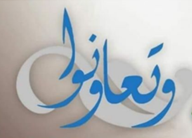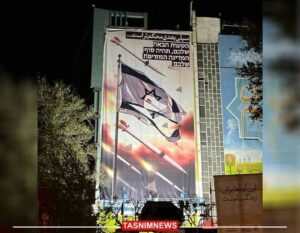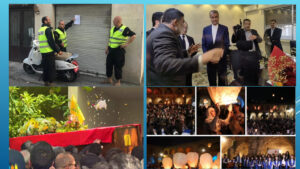The “Help Each Other” Association Charity (in Arabic: جمعية “وتعاونوا” الخيرية | Transliterated in English: Wataawanou Association Charity) is an association that collects donations and helps the needy. Its activities are carried out throughout Lebanon in general and south Lebanon in particular.
The date of the association’s establishment is not officially clear. However, all its social media accounts (the association apparently does not have an official website) were established in 2020.

The figure most identified with the association is a man named Afif Shuman, aka “Hajj Fadel” (حاج فضل), a social activist and ardent Hezbollah supporter. Shuman has extensive activity on social networks, especially on his popular Facebook and Twitter accounts, which include tens of thousands of followers.

Afif Shuman’s personal details: Mail address: [email protected] Phone numbers: +961 3 056 431 080 76 304 961+ (the official number of the association) 080 71 304 +961 |
In addition to Afif Shuman, there are two other known prominent activists in the association:
- An activist named Raheb, who, according to his Twitter page, is also a reporter for the Russian Today news network in Arabic (RT)

- An activist named Ousama Nour Al-Din, who, according to his Twitter page, is a software engineer by profession

The association raises funds through an account affiliated with the Al-Qard al-Hasan Association, which belongs to the social unit of Hezbollah’s executive council and is subject to sanctions. The Al-Qard al-Hassan Association provides those in need with loans under Islamic law on favorable terms, without interest, in exchange for low guarantees. Over the years, the association has become a money laundering arm for Hezbollah. The number of debtors is currently estimated at least 200,000. The volume of loans is estimated at half a billion dollars a year.

On the left in blue – the “Help Each Other” association (وتعاونوا) logo
The “Help Each Other” association is another layer in Hezbollah’s extensive financial mechanism. Its system for collecting funds appears to be an integral part of Al-Qard al-Hassan.
The association does not operate undercover, and its members make no effort to obscure their affiliation with Hezbollah. Quite the contrary. The head of the association, Afif Shuman, and the other activists spread the organization’s doctrine with greater intensity. Shuman is frequently interviewed by the Al-Manar TV channel and publishes posts on social networks identifying with the Shiite resistance axis. The society’s various social media channels also fearlessly reverberate its connection to Al-Qard al-Hassan.
The association is well known, among other things, for its recent efforts to provide financial assistance to the 300 families working in the carpet factory in the village of Zefta near Nabatieh that went up in flames in early July. The village of Zefta is a Shiite village, most of which support the Amal movement. Through the “Help Each Other” association, Hezbollah took advantage of the fire, which caused hundreds of families to lose their income to gain sympathy, support, and influence in the village at the expense of the Amal movement.
The association strictly publishes an image of an entity that raises and distributes donations, loans, and guarantees for the benefit of those who need them. The association’s social media pages are full of ongoing documentation of its charitable activities, with its strict adherence to documenting every donation it raises and any guarantee it provides to institutions and private individuals, in the form of invoices and receipts that its members upload to social networks.

Hezbollah creates influential leverages through the association’s dealings, not only in south Lebanon, while taking advantage of the dysfunction or deficient functioning of the institutions of the Lebanese state. In recent months, the association has been concentrating more and more on helping various populations and institutions in non-Shi’ite communities. The city of Tripoli in northern Lebanon, which has experienced several crises in recent months, is a prominent example of how the funds of the Shiite Association, an arm of Hezbollah, are transferred to the Sunni population.
Various indications show a pattern in which the association provides assistance and guarantees to the residents of Tripoli who cannot afford it:
At the beginning of June, a jaundice epidemic broke out in the city of Tripoli. Due to the Lebanese health system’s lack of resources, the association “Help each other” sent delegations to the affected areas providing financial assistance to patients who could not afford to pay for medical treatment and medicines. Throughout June, the residents of Tripoli were taken care of by the association that filled the vacuum left by the Lebanese authorities.
On June 9, Afif Shuman acted to transfer Hassan al-Sitari, a child suffering from a congenital and bleeding head condition, to a hospital in the city of Baalbek, apparently on direct orders from Hassan Nasrallah. Shuman informed the boy’s family that Nasrallah personally pledged to cover all of the boy’s medical costs.
On June 12, the association guaranteed life-saving treatments for a Tripoli national named Mohammed al-Ali, who needed urgent heart surgery at the cost of 50 million Lebanese pounds.
On June 14, the association intervened again to save the life of a girl named Aida al-Humosi, who needed urgent heart surgery and was transferred to Al Rassoul Al Azam Hospital at the association’s expense.
On June 27, the Dahr Al Maghri (ضهر المغر) building in the Qobbeh area of Tripoli collapsed, injuring several people and leaving at least 14 families homeless. The “Help Each Other” association and Afif Shuman were among the first to offer assistance, hurrying to the site of the ruins.
Shuman told local media that the association immediately delivered approximately one million Lebanese pounds in aid to anyone damaged by the collapse of the building and more than 100 rations of food. Shuman also stressed that the association he heads is “an association that supports the resistance and is proud of it, but it does not belong to anyone… It is a legally registered Lebanese association, not an Iranian association as they tried to portray us… “.
We could not locate official documents proving that the “Help Each Other” association is indeed a legally registered entity.
It seems that not all residents of Tripoli take a liking to the association’s activities in their city. According to one of the publications on the “Nushatta” website (the “Activists”), the picture that the “Help Each Other” association is trying to portray on social media describing the people of Tripoli as grateful for the assistance it provides, is nothing more than a distortion of reality. When the delegation of the association, headed by Shuman, arrived in the area of the demolished building and the local residents found out their identity, it aroused great anger among them. According to the report, some of them fired in the air to oust the “unwanted delegation.”
Despite the declared opposition of some of the residents, the association’s growing activity in the Sunni stronghold in Tripoli indicates Hezbollah’s familiar strategy: creating a dependence of the civilian population, even the non-Shi’ite population, on Hezbollah. Thus, Hezbollah is trying and even succeeding in creating sympathy for itself, even among non-Shiite populations, enabling it to operate freely, and de facto take over the Lebanese state.






